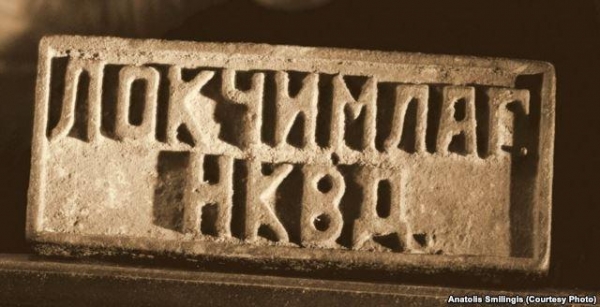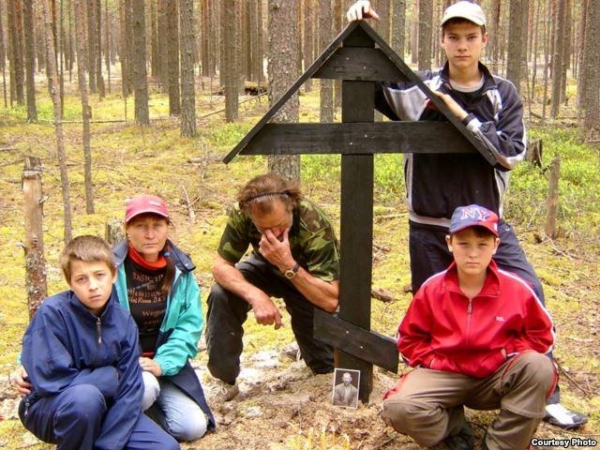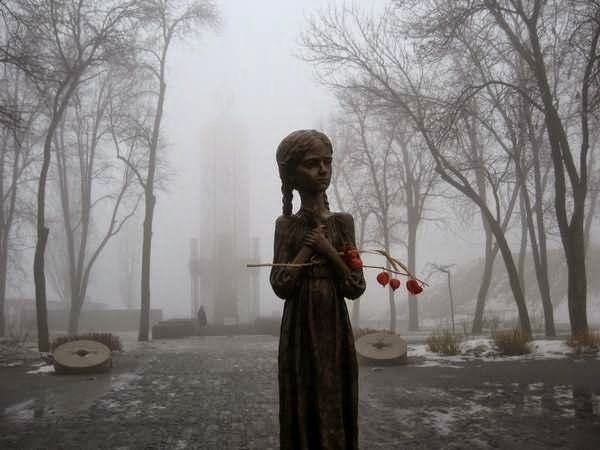
He was 14 when his house came the NKVD, and that day changed his life
He was a teenager from an educated European family, was fond of adventure novels, not interested in politics, knew nothing about the Soviet Union and spoke Russian. But Russia has played in its destiny a fatal role.
Anatolis Smilingis was born in 1927 in independent Lithuania, plungė, in the family of teachers. In 1940, his country was, by agreement between Hitler and Stalin, Soviet troops occupied. In June 1941, along with thousands of other Lithuanians family of Smilingis deported. Soon his father died in the camp near Krasnoyarsk. The mother of 14-year-old Anatolia and his younger sister Rita with the children was in the Komi ASSR. They were called settlers, but in fact they were as much prisoners as ordinary prisoners of the Gulag. They were on the territory of a huge liquidated in 1940, the camp – Lockimage in spetsposelok “Second phase”.
Soon arrested the mother for taking on the stables a handful of oats for his starving children. She, too, died in the camp. But the children survived. Rita was able to return to Lithuania, Anatolijs still lives where his family has been sent according to the plan developed by Lavrenty Beria, in the Republic of Komi, the village of Kortkeros. He, like his parents, became a teacher and decided not to return home. 88-year-old Anatoli Smilingis examines the history Lockimage – mysterious camp, which existed only two years, looking for the cemetery of the prisoners and sets up memorial crosses.
A conversation with Anatolia Smilingis was written when he was 75 years since the deportation of hundreds of thousands of residents of the occupied by the Soviet army of the territories of Estonia, Latvia, Lithuania, Belarus, Ukraine and Moldova.
Do you remember the day of the arrest?
Came two soldiers and two civilians. Said: father, mother, sister, I, our whole family, four people – are subject to removal, relocation to other places. Father and mother were home, the mother immediately burst into tears. I in Russian did not understand, but mom and dad knew the Russian language. Mother during the First world war, he worked for the Red Cross in Russia. Brought us from. Nearby was the railway station, the cordon. Put in cattle cars. Father immediately separated into another car. More I haven’t seen it.
– Someone informed or have enough random people?
– In Lithuania I called the names of the people who said that our father – the enemy of the people. They are long dead. Apparently, pre-candidates were selected, and 14 June 1941 was the first mass removal of the families. Before the military took out, and here is the civilian population.
– And a few days later Germany attacked the Soviet Union…
– That the war started, we found out when our train was standing in Minsk. To carry – did not. Drove long to Kotlas. There were put on barges – me, mother and sister.
– As you perceived this?
– I had read Jack London, Mayne Reid, was wondering even where to carry. This was an adventure mood.
– And what did the Soviet Union?
– I in Russian did not know a single word. Father and mother understood everything; I have often heard talk that there will be war. Germany occupied Klaipeda, and from there came my father’s brother, offered to move to Germany, I had a conversation: come on, I’ll take out. Father refused to leave. He and his mother talked with – in Germany or in Russia? Father said that if Germans will come in German will be better than in Russia. When the Soviet troops arrived in 1940 after the Molotov – Ribbentrop Pact, of course, the family was against the idea, but I didn’t pay attention: 14, was a kid.
Big was the train?
– Very large. When we arrived, the women of Lithuanians said that after us there was another train, it could not send, and the NKVD shot them. I’ve studied the history of repression, but have not found such data.
They feared that the Germans captured, and destroyed them all?
– Yes. Because in prisons in Lithuania destroyed everyone of the prisoners before the arrival of the Germans – it’s true. But about the train, which after we did, I found nothing.

The family of Smilingis in the year of the takeover of Lithuania by Soviet troops, 1940
– There were a lot of children in your tier?
– In our car, it was probably 15-20 families, all the families were taken with children, without children I don’t remember. We were in the empty barracks eliminated Lockimage, we were delivered to the logging.
– Your father was in another camp?
– He was sent to Krasnoyarsk camp there in December 1941, he died. I don’t know where the grave of his father. It is suspected that he was shot. Although the lists of all the repressed Lithuanians published, and among those shot, his name is not.
– In the memoirs of Racemasa of Rimvydas says that your mother was arrested because she plucked a few ears of corn on a field of rye.
– Not on the field. From the stables she brought us a couple of handfuls of oats, which horses were fed. In an hour came, took her away, and all the more we didn’t see her. It was in early 1942. A year later, she died.
At the time, had famine?
– Yeah, it was the beginning of hunger. All stocks were destroyed. In the dining room, cooked millet, it’s not even soup. Gave grease, kerosene, food. And 600 grams of black like soap, bread. I have already started working. At first felled, and then took the forest, pacoval logs. Were Chinese, Koreans, they are the movers were. I took into account how many logs they will ship. Began to speak Chinese, oddly enough. They spoke Russian, young guys, and I was 14 years old. In Russian I didn’t understand the first Russian words – it was a Mat.
– But you were not considered prisoners?
– We had a village, there is nowhere to run, around the taiga. To us from the camps were sent those who in the camp is not profitable include: Chinese, Koreans, Finns. Was released from the camps of the so-called goners, they just sent to die. The Chinese more or less kept. Very much from Iran, we called them Persians. They had never seen snow. No clothes, no food there, almost all of them died.
– The work was very heavy?
– Imagine the snow belt, it is necessary to cut down the tree to the stump was not above two or three inches from the root, it is necessary to dig it out. Then dump the tree to cut it a certain length, cut branches, these branches should be burned – in winter, the damp twigs. To meet the standard. The norm does not comply, I reduced the bread or do not give. Man, if one day, another the bread will not get, he has to work will not work, and the work will come, him bread is not given, it weakens, and then to the cemetery.

Spetspereselentsev on rafting of logs 1959
– The famine has lasted long?
– I was starving in 1941, 1942, 1943, 1944, it became easier. Consider three years, the hunger to live, to dream only of bread. When hungry, constantly thinking about food, the other is not in the head, oddly enough, the only food day and night. I’m a little fed up sometimes Chinese. Was the system planned, I’m gradually adjusting, then become a master. There was no one in the war of men is almost gone. Children, women and liberated from the camp – bombers. The Chinese were younger. And the plan should be carried out, plan big. Not on paper but on the fanerku to glass every day write, how many logs, planks. Bring, head flamed Mat – small. How little? I check math was. A little more should be. Then I figured it out: it was necessary to attribute two to three times more. Head shot, if he do not fulfill the plan. Had to add. I added anybody. The Chinese understand, I’m a little fed up. They were able to survive. Always one was in the fields, went to the village, catch dogs, cats, and then did not, they began to catch in the village of rats. Once I come in: Roofing, go and eat. Eat, very tasty. Ask: what is that meat? “Klisa, Roofing, klisa”. They the letter “R” does not utter.
– You managed to find out what happened with your mother?
– At first I wrote, there was no answer, no answer, and after the war I received a message that she died from dysentery in Coscom camp. And now there is the camp, one of the longest camps in the Komi Republic. From the very beginning and today there camp.
– And your sister?
– In 1944 began to take out the poles, orphans, few of the Jews of Lithuania. She went with the Polish children in Vilnius now lives.
– Have you had a chance to leave?
– The first opportunity I did it in 1944. I was very supportive of the Chinese. The Chinese were yellow passport without citizenship, we have no documents, we were under the supervision of the NKVD. The Chinese gradually began to send to Moscow the passports, in exchange they sent the passport of the citizen of China. They started to leave. One of these Chinese in the spring of 1944 started the conversation: I go to China, let me adopt and take out. I laughed where I was in China. I will not go. He I fairly begged. And did not go. Then a little bit sorry.

The children of the special settlers in the orphanage, 1946
– When will the next opportunity come from?
– We have in spetsposelok brought prisoners of war, Vlasov so-called expulsion for 6 years. Among them was a very interesting doctor Kruzhilin, a military surgeon, older. Put it on lumps of gas generator. We have the machines worked during the war years on gas generators. Put him with grandparents to cut the lumps. I had attended. The party had abortions prohibited. It is sometimes invited to the regional centers on abortion underground. And then he was made surgeon of the local hospital, then a doctor. The first penicillin in the army in the experiments were used. I got sick with typhus, in hospital. When recovered, he left me a caretaker to work at the hospital, agreed with the NKVD, they say, no work. And there the young women were, sent them after graduation to work. And here is one of them, Abakumov, a little bit in love with me and proposed to marry, said, I will release you and take it away. Know Abakumov, Beria’s assistant? She was his sister turned out to be. I then wasn’t attracted to women, I didn’t bother to be friends with her. She pleaded with me: I’ll steal you, release and so on. I remember with the police are very ill-treated, did not recognize anyone. They worked in the year and left. Here’s a chance interesting was to leave. Then was the opportunity to go to Lithuania, I have appeared, I set aside, set aside, and that’s still true.
– When you become a free man?
– When under a rehabilitation fell, 1956. The passport gave me. In my old passport it was written “without the right of departure from the Komi Republic”. Then my passport was replaced, give a real. In 1956 said I was rehabilitated, all restrictions removed from me. Said the police, was given a new passport, and that’s rehabilitation. No documents, no signatures, I just told it. No reason, nothing happened.
And when he learned the Russian language?
– I was never taught, he learned. At school some teachers helped. One day I studied the Russian language.
– You speak very good.
– Normally speak and write, the computer helps to correct errors.
– Many years passed, and Lithuania gained independence, the Soviet Union collapsed. What holds you in the Komi Republic, why have you decided to stay in Russia?
– When I come to Lithuania, my sister says that you’re in your Komi found? I have Lithuanian citizenship, although there is not a single day did not work. I was interested in nature, I as a tourist to cover all of the Republic of Komi, the Urals, all the remote places. In that time I’ve seen the camp, but then was not allowed to speak. I gradually started doing story cemeteries, recorded memories. Stuck in this, can not get. People come from different places, even different countries in search of their relatives. We have to help them, to show these places. I can not throw. Every year I think: another year, another year. I don’t see that someone after me will do. The problem for me to leave.

Cemetery of the Second segment of kortkerossky smallholders. Kortkerossky district of the Komi Republic. The deportees were buried here in 1942-1964
– You are the only person of special migrants or ex-prisoners Lithuanians remaining in the Komi Republic?
– In the village of Kortkeros, where I live, Lithuanians two women. They have a family. One goes to Lithuania, but the family, grandchildren, great-grandchildren here, she is unable to part with them. Another patient already. I in our area, one Lithuanian men, who know the language. In Syktyvkar there are one or two which spoke Lithuanian, but I’m not familiar with them.
– And of former political prisoners remained someone?
– Political prisoners are already living in our area there. War veterans in our area one or two left. Political prisoners harder to get, have no one practically. There are former settlers, like I did. Enjoy the benefits of small are going, do not interfere like.

Conditional the grave of the Cossack, who died at Lockimage
When you were 14, you were not interested in politics, do not understand what is Soviet power, what Stalinism. And when they began to understand?
– For the first time I felt the hatred of the people to the Soviet regime, to the regime, when Iranians – apparently, from the elite; they were tall, thin, hungry – were allowed to kill a dying horse. They opened up her throat, poured the blood into a tin can and drank, “that Stalin has died.” A toast, two or three times with these words. The first time I felt hatred. But then very afraid. You know, still a little afraid, although it is possible to speak on this subject. One man who crushed the newspaper with a portrait of Stalin, was given 10 years. He was there in the camp and died. Very hard mode, people were afraid of any statement. And the local old people feeling remained until now. I do now memories, people questioned, even today, is quite difficult to bring to an open conversation, a sense of fear remained. I also used to be, but ten years ago left, not afraid.
– Remember the death of Stalin and the XX Congress? How did people react?
– Remember Stalin’s death very well. To store such a Bahai, very intelligent, competent person of IDPs, takes the bottle and loudly announce to everyone the good news that Stalin died. Many then rejoiced. As the twentieth Congress Khrushchev, we had pretty quiet. At first, the rumors were pretty long. Learned through gossip. Then after some time there appeared in the papers, but very sparingly. Talking about a closed letter. Learned in a year more or less really about the Khrushchev report. You know, people were afraid and did not really believe what happened. Afraid to speak, fear remained.
And when Solzhenitsyn came to you?
– At first I “Voice of America” heard in the programs, and “One day of Ivan Denisovich” I was told when I was in Lithuania. For me news special and was not, everything was familiar, he wrote.

– Solzhenitsyn didn’t write about Lockimage that you are doing.
– On Lockimage wrote, there is only one page. This camp is special, he is little known, lasted from 1938 to 1940 – the great terror campaign of the most brutal mass murders in the history of Russia. In 1937 he opened up and really started to work in 1938, began to bring in prisoners EN masse. Two years later, the camp became almost extinct. There is a lot of mystery. This is a death camp, 26 thousand in 1938, and in 1940, 10 thousand prisoners. What happened? All I remember for column column went to Lokchim in the other camp, but nobody saw. So many mysteries, so many cemeteries. When another could not write, a couple of people said something. In Lockimage was an Austrian Jew Dmitry Franzevich Clermont, he’s told me. As you begin to talk about politics, he immediately ran away, didn’t say anything. Once let slip that the rise in camp was woken up not by rail, as we do, and sticks, and every morning went the arrows of the so-called. If you believe him, then he came here, he played at the funeral of Lenin, was cold, they were given that pipes do not freeze the alcohol, he was drunk, and it was in the far East. From the Far East, then sent him to Komi, left after Lockimage in the settlement. He then worked at the club organized a brass band died. Here his descendants still live.
– That is, he was arrested because he was playing badly at the funeral?
– According to him, at the funeral of Lenin in red square. The orchestra is great, and it was freezing. The whole band said, then got drunk and took them.

One of the graves Lockimage
– Why in 1940 Leccima closed?
– Probably, the camp was made for the show. He brought in 1939 56 million rubles of losses. Grown watermelons for show, head every week, traveled to Moscow in the restaurant. The Communists, you know, harshly treated such visits were not allowed, so it was agreed. A lot of dark in this camp so far. This camp surrounds 10 cemeteries, they buried the seven saints of the Russian Orthodox Church. It arose simultaneously with the camps in Vorkuta, INTA, Ukhta. There oil, gas, coal, and here the camp as a plant for wood cutting. The forest was cut down, and the traces of the camp remained everywhere, all over the vast territory. The peculiarity is that he apparently was on the brink of survival. That is, the Communists wanted to conquer the nature from anything the camp had to provide for himself, barracks, houses. Roads made of logs, fuel chocks. The turpentine had the car. The car started up, then sank her birch chocks, very hard start, low-power machine was. The food the camp had to provide for themselves, tool. This experience, probably, were unsuccessful. Evidence in the archives of the very few, with great difficulty to the archive came and so watched a lot could not be rewritten. It turns out that this camp was subordinated mainly Beria. 56 million in 1939 to make a loss! All the camps of the USSR of such loss together is not given, how he is one. Also a mystery.
That is, the camp did not justify itself, has brought nothing but losses and death from frostbite, malnutrition. People died like flies in the camp. Products not received, a massive loss. Are even rumors that people ate from hunger. I had heard many terrible stories about this camp. Kept half naked in the winter, so could not escape. Probably not in time for such a large amount to prepare even the barracks. We lived in Lakokraska the barracks, they were normally constructed. In the villages Adjer and Ptmeg some buildings from the camp still.

The prison commandant’s zone Lockimage in the village Adjer
And people now live in camp buildings?
– Yes. In Vorkuta, INTA arose the city, traces of camps destroyed, many houses in the cemeteries are. But here they cut the forest, the forest does not grow quickly, left the cemetery, left the house, were former prisoners and remained guarding the camp. Left the wait staff, management, arrows, security. Then, when Leccima eliminated, 1956, remained an agricultural camp. Five zones have a camp, a Polish area, Chinese area was. People were mixed up, now the fifth generation is growing up. The descendants brought the building in order, there is a building of the investigative Department, there is a building of camp files. Of the six buildings management Lockimage two, built in 1938, the auxiliary school. Building a good, beautiful, still in use. The prison was left, camera left, even those where people were shot. Asked the man who lives there: like, not dreaming of anything? No, it says it’s not a dream. Such indifference of posterity, when all is experienced, milled. The fifth generation, they remember nothing about the camp, they are not interested.
– Seen in your Facebook photos of the descendants of the political prisoners, who come to seek the grave.
– Come. Recently was from Stavropol. The documents he died in Lockimage. And Leccima had about 50 branches. And where he died? Where the office was, 4 or 5 cemeteries around one village a mass grave. Were buried in one pit until it fills, then the next digging another pit, a third. Where to find the grave of the deceased? Know about what year, which leads to the cemetery, he places a memorial cross, praying.

Kirill A. Polenov, groom farm “Karl Marx”, Aleksandrovsky district of the Orenburg region, in 1937 as an enemy of the people sentenced to 10 years of concentration camps. In 1938, died in Lockimage. Descendants came in 2016 to honor his memory
– Many people died?
– No one counted. There were 26 thousand in 1938, in 1940 already 10 thousand, the camp was removed, there was only one plot, celgosivir. Where else happened, nobody knows. Remember the stages through the village where I live, every day for two or three stage drove up. When we arrived in 1941, around the camp were towers, a fence, a palisade of three-meter, five barracks, everything was clean, swept, tidy, and very beautiful. Women our say – even the stove warm. Like yesterday people lived. And people what happened? No one has seen. Here’s a strange thing..

Kortkeros celebrates victory day on may 10, 1945
Archives of the camp remained in Syktyvkar?
– Lakokraska archives us after a couple years of trouble showed. The order book, the signature of Beria saw. Something was allowed to rewrite, take a look, we rewrite, and took receipts. Only the order book, the rest did not show us.
– I feel that the cult of Stalin reborn?
– We are opposite the administration a bust of Stalin stands, sometimes there are Communists meet. But many older people do not recognize Stalin. That is, ambiguous attitude. Young people have manifested such tendencies, need order, need Stalin. They have no idea what Stalin’s regime. Because the order was the price of human corpses, so that’s how. Old people with whom I meet, my generation, but few of them, they are afraid that, God forbid, Stalin back.
– Don’t want to go to Lithuania?
– I grew up here, I have to see it to the end. Or is it called conscience, or mental attitude. I’ve right people. All the information that I have accumulated need. History Lockimage still collect the crumbs. The Soviet archives is contrived bullshit. I during the war were attributed to forest, half all tuftovye. In 1941, about Leccima stacks of firewood, kilometers along the river and from the river one hundred meters, four or five rows. We spent all summer rolled – vegetali, maybe a hundredth. In the autumn, when the snow began to fall, we were forced to burn these logs. They do not burn, the raw, we’re probably a month burned. The snow fell, came to the Commission, we were awarded, I was given two norms then the bread, praised that we did with the state job, rolled up the forest. And we burned it.
I worked as a foreman, foreman, forest, took, had all the time to finish, otherwise the authorities would be planted, and during the war were shot for failing to plan. Opportunities to implement the plan neither technical nor human was not, and the plans were. Archives I consider them unreliable, I think the only authentic stories of people. In recent years, more engaged with the camp graves. Semi-Pro can distinguish the camp of burial and time. Put on the graves of 16 of iron crosses in remote places where people do not go. No one interferes, but does not help.
– There is no monument to the victims of repression?
Only in the village Adjer stone big set. Here we have Sands everywhere. My wife helped to find a stone in your career, have managed to establish, where the label “Prisoners of the forest camps.” A great big stone, a huge glacial granite, far from the prison building, standing like this for ten years. Grow a new generation, the fifth, the sixth. Everywhere in the world, not only in Russia, sprouts repression live. They could grow up, it is necessary that young people know.








